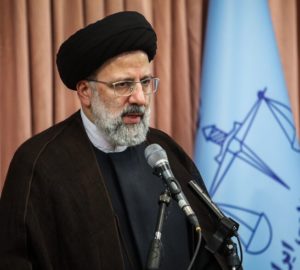With the Election of Iran’s Raisi, the JCPOA Is in Hot Water

Mehr News Agency, CC BY 4.0 <https://creativecommons.org/licenses/by/4.0>, via Wikimedia Commons
In less than a month, hard-line conservative cleric Ebrahim Raisi will succeed Hassan Rouhani as President of Iran, after sailing to victory in a highly uncompetitive and “predetermined” sham of an election.
The victory for Raisi, however, is not likely a win for the Biden administration. Raisi’s antagonistic posture towards Washington, combined with his abhorrent record of human rights abuses, may sink Biden’s ambitions of US re-entry into the Iran nuclear deal, known as the Joint Comprehensive Plan of Action (JCPOA).
Raisi is no stranger to Iranian politics. He currently serves as the chief justice of Iran’s judiciary, and is a close confidante of Supreme Leader Ayatollah Khamenei. And like Khamenei, Raisi has already communicated his intention to take a tougher stance towards Washington than that assumed by his more moderate predecessor, Rouhani.
While the likelihood of successful US re-entry into the JCPOA was always a tenuous proposition (despite assertions to the contrary from the Biden administration), the negotiations just grew much more challenging with the recent Iranian election results.
To its credit, the Biden team has remained firm in its messaging that the ascendance of the hard-line cleric will not affect the United States’ ability to resuscitate the deal. But current signals from an incoming Raisi, combined with lack of any substantial progress after six rounds of nuclear deal talks, indicate that the optimism repeatedly touted by the Biden administration may be unrealistic.
For starters, mere days after the election, Raisi asserted he would not be meeting with President Joe Biden, even if the United States lifted all sanctions on the regime. Raisi has also flatly declared that Tehran has no intention of offering anything more than simple compliance with the 2015 nuclear deal in exchanging for the lifting of all sanctions, denying any Iranian interest in follow-on negotiations with the United States to address Tehran’s ballistic missile program and its support of regional terrorist proxies.
This declaration flies in the face of all the prior messaging from Team Biden that re-entry would be a mere steppingstone for a “bigger, better deal.” As David Jonas and I previously wrote in The Washington Times, the promise of a more robust deal after re-entry (and the lifting of sanctions) was always a pipe dream, especially since sanctions comprised the bulk of US leverage. Once sanctions are lifted, the United States has little to credibly compel Tehran back to the table.
Creating further diplomatic distance is the fact that Raisi will be the first Iranian President to already be subject to US sanctions before even entering office. The incoming president is sanctioned for his alleged involvement in the state-ordered execution of thousands of political prisoners in Iran in 1988. Reports estimate that between 5,000 and 30,000 Iranians were murdered via hanging or a firing squad in a span of just a few months for their alleged failure to pledge allegiance to the Islamic regime. Raisi, it is claimed, questioned some of the prisoners himself before ordering their execution.
Given the Biden administration’s purportedly strong stance on human rights abuses, the election of an alleged mass murderer should further complicate negotiations. As US Secretary of State Antony Blinken recently stated in March, “[T]he Biden-Harris administration will stand against human rights abuses wherever they occur, regardless of whether the perpetrators are adversaries or partners.” In simplest terms, the lifting of US sanctions on a regime whose incoming president goes by the nickname “the butcher” would far from comport with such messaging.
The effective appointment of Raisi by Khamenei indicates that Iran knows itself to be in the position of power vis-à-vis JCPOA negotiations with the United States. As Mariam Memarsadeghi recently wrote in Tablet, “Khamenei feels unconstrained in choosing his potential successor and untroubled at making the American capitulation look even more desperate and devoid of morality.” Khamenei claims that he cannot trust the United States to abide by a JCPOA reentry (and furthermore, that he cannot trust the United States in general), given that Trump exited the deal.
In reality, Raisi’s stage-managed election should undermine US confidence that a sustainable deal could ever be reached with this regime — or that a regime that appoints Raisi as president would ever credibly abide by the deal.
The United States has made clear that it is desperate for a deal, seemingly at any cost. The cost will now include lifting sanctions on a man and a regime that symbolize the very repression the United States has actively advertised itself as opposing.
Erielle Davidson is a senior policy analyst at The Jewish Institute for National Security of America (JINSA).
Originally published in The Algemeiner